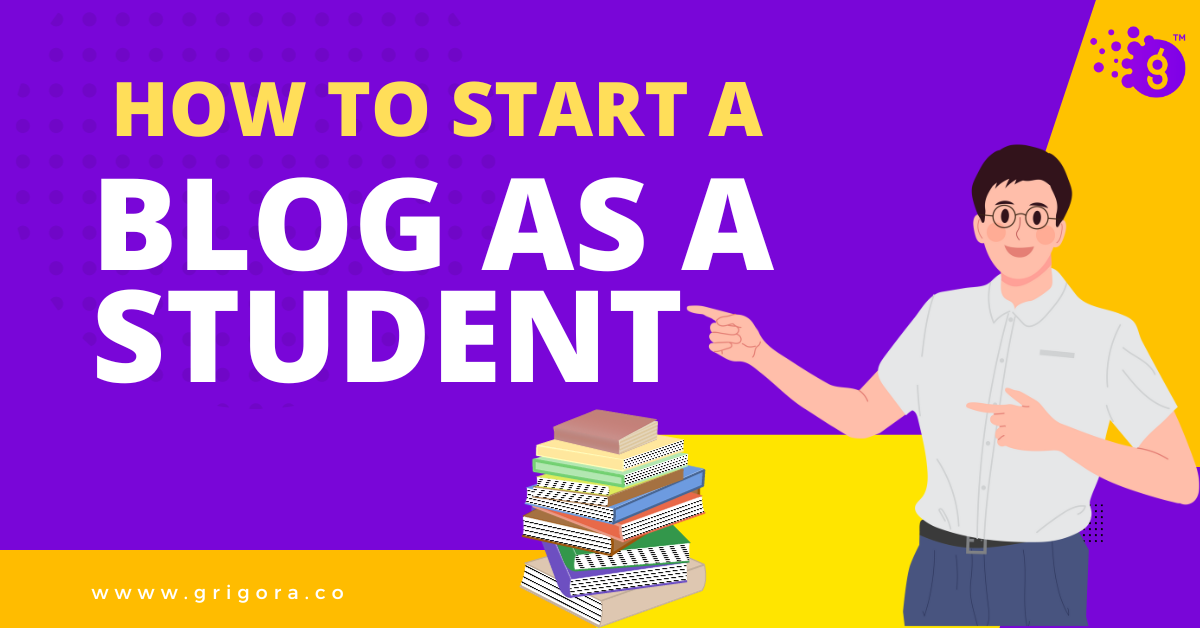Introduction: Embarking on a Student Blogging Adventure
Blogging is not just an activity; it is an investment in our future selves. It's where we document our growth, ideas, and dreams.
Unknown
In the dynamic and ever-evolving world of digital communication, student blogging has emerged as a powerful tool for personal and academic development. Blogging offers students a unique platform to express their thoughts, share their knowledge, and connect with a global audience. It's not just about writing; it's about creating a personal brand, enhancing digital literacy, and opening doors to future opportunities.
Step 1: Embrace Your Passion and Purpose
Blogging as a student is not just about putting words on a digital page; it's about expressing your passions and sharing your unique perspective with the world. The first step in your blogging journey is to identify what drives you. Are you passionate about environmental issues, fascinated by technology, or looking to share your artistic talents? Your blog should be a reflection of what matters most to you.
Step 2: Choose Your Niche Wisely
Selecting a niche is a critical step in establishing a successful student blog. Your niche should be a unique intersection of your interests, academic pursuits, and what you believe will engage your audience. It's about finding that sweet spot where your passion meets the needs or interests of your readers.
Step 3: Selecting the Perfect Blogging Platform
When it comes to blogging, the platform you choose can significantly impact your experience and success. For student bloggers, the ideal platform is one that offers simplicity, affordability, and the ability to customize. You want a platform that grows with you as you evolve from a novice to a more experienced blogger.
Grigora emerges as a top choice for student bloggers due to its user-friendly interface, cost-effective plans, and extensive customization options. It's a platform that understands the constraints and needs of students, offering a balance of simplicity and functionality. Whether you're blogging for the first time or looking to expand your digital presence, Grigora provides a seamless experience that aligns with your blogging journey.
Step 4: Setting Up Your Blog on Grigora
Setting up your blog on Grigora is a straightforward process, making it an excellent choice for students who are new to blogging. Grigora's platform is designed to guide you through each step, ensuring a hassle-free setup.
Start by choosing a unique domain name that reflects your blog's theme or your personal brand. Grigora offers easy domain registration, helping you secure the perfect web address for your blog.
Select a theme from Grigora's diverse range of templates. These templates are not only visually appealing but also customizable, allowing you to add a personal touch to your blog's design.
Customize your blog's layout and design using Grigora's intuitive tools. You can adjust colors, fonts, and layout elements to match your style and the tone of your content.
Set up essential pages like 'About Me', 'Contact', and 'Portfolio' to give your blog a professional and comprehensive look.
Familiarize yourself with Grigora's dashboard. It's where you'll manage your posts, view analytics, and access various features to enhance your blog.
Step 5: Crafting Your First Content Plan
Creating a content plan is crucial for maintaining a consistent blogging schedule, especially for students balancing academics and blogging. Grigora's content management tools are designed to help you organize and schedule your posts effectively.
Identify key topics and themes that resonate with your niche and audience. This step is essential in creating a focused and engaging content strategy.
Develop a content calendar. Plan your posts in advance, considering important dates, events, or academic deadlines. Grigora's scheduling feature allows you to set publish dates in advance, ensuring regular content updates without the stress of last-minute writing.
Mix different types of content such as articles, interviews, reviews, or personal stories to keep your blog dynamic and interesting. Grigora supports various content formats, giving you the flexibility to be creative.
Plan for guest posts or collaborations. This can bring fresh perspectives to your blog and expand your audience. Grigora's platform makes it easy to manage multiple contributors.
Regularly review and update your content plan based on feedback and performance analytics. Grigora provides insights into which posts are performing well, helping you refine your strategy over time.
Step 6: Engaging and Authentic Content Creation

Creating content that truly resonates with your audience is a cornerstone of successful blogging. As a student, you have the unique opportunity to blend your academic learning with personal insights, offering a fresh perspective to your readers. This involves not just sharing information, but telling stories, expressing opinions, and sparking discussions that engage and inspire.
When crafting your blog posts, focus on authenticity. Write about what you know, what you're learning, and what intrigues you. This genuine approach will not only make your content more relatable but also help you establish a distinct voice in the blogging community. Remember, your unique experiences as a student are what set your blog apart.
Additionally, consider the format and presentation of your content. Use a mix of text, images, and even videos to make your posts more dynamic and engaging. Interactive elements like polls or quizzes can also encourage reader participation and feedback.
Lastly, always be open to learning and evolving. The world of blogging is ever-changing, and staying adaptable will help you keep your content fresh and relevant. Whether it's exploring new topics, experimenting with different writing styles, or incorporating feedback from your audience, each step is a part of your growth as a blogger and as a student.
Step 7: Building and Growing Your Audience
Understanding Your Target Audience: Begin by identifying who your blog is for. As a student, your audience might include fellow students, educators, or professionals in your field of study. Understanding their interests and needs is key to creating content that resonates with them.
Leveraging University Networks: Utilize the networks available at your university. This could include posting on university forums, contributing to newsletters, or participating in student groups related to your blog's niche. These platforms offer a ready-made audience interested in student perspectives.
Social Media Strategies: Social media is a powerful tool for expanding your blog's reach. Platforms like Instagram, Twitter, and LinkedIn can be particularly effective for student bloggers. Share your blog posts, engage in relevant conversations, and use hashtags to increase visibility.
Engaging Content: Create content that encourages interaction. This could be through thought-provoking questions, polls, or discussions on current events related to your niche. Engaging content can lead to higher shares and comments, further boosting your blog's visibility.
Collaborations and Guest Posts: Collaborate with other student bloggers or influencers in your niche. Guest posting on each other's blogs or co-creating content can introduce your blog to new audiences.
Email Newsletters: Start an email newsletter to keep your audience updated on new posts and special content. This can help retain readers and build a loyal community around your blog.
Consistency is Key: Regularly updating your blog with fresh content is crucial. A consistent posting schedule keeps readers engaged and coming back for more.
Feedback and Adaptation: Pay attention to the feedback from your audience. Comments, shares, and engagement metrics can guide you in refining your content strategy to better suit your readers' preferences.
Step 8: SEO Optimization with Grigora
Understanding and implementing SEO (Search Engine Optimization) is essential for increasing the visibility of your student blog. Grigora's built-in SEO tools are designed to optimize your blog posts for search engines, enhancing your blog's discoverability.
Learn the basics of SEO. Understanding keywords, meta descriptions, and how search engines work is crucial. Grigora provides easy-to-understand resources and tips for beginners.
Use relevant keywords. Identify keywords that your target audience is likely to search for. Grigora's SEO tools can help you integrate these keywords naturally into your posts.
Optimize your blog titles and headings. Make them clear, engaging, and keyword-rich. Grigora's editor ensures that your titles and headings are SEO-friendly.
Create quality content. Search engines favor high-quality, original content. Grigora's platform supports rich media content, allowing you to diversify your posts with images, videos, and infographics.
Improve your website’s loading speed. A faster website provides a better user experience and is favored by search engines. Grigora is optimized for speed, ensuring your blog loads quickly.
Ensure your blog is mobile-friendly. With the increasing use of mobile devices, having a mobile-responsive blog is essential. Grigora's themes are designed to be responsive across all devices.
Use internal linking wisely. Linking to other posts on your blog can keep readers engaged and improve SEO. Grigora's interface makes it easy to add and manage internal links.
Regularly update your blog. Fresh content is favored by search engines. Grigora's scheduling feature can help you maintain a consistent posting schedule.
Step 9: Monetizing Your Blogging Efforts
Exploring Monetization Options: As a student blogger, there are various ways to monetize your blog. These include affiliate marketing, sponsored posts, advertisements, and selling digital products or services. It's important to choose methods that align with your content and audience.
Affiliate Marketing: Partner with companies or brands relevant to your blog's niche. By including affiliate links in your posts, you can earn a commission for every sale made through these links. Ensure to disclose any affiliate relationships to your readers.
Sponsored Content: Collaborate with brands for sponsored posts. These are posts where you're paid to write about a product or service. Remember to maintain authenticity and only partner with brands that resonate with your blog's theme and values.
Advertisements: Utilizing ad networks like Google AdSense can provide a steady income stream. These networks place ads on your blog, and you earn money based on views or clicks. Be mindful of the ad placement to ensure it doesn't detract from the user experience.
Selling Digital Products or Services: Consider selling digital products like e-books, courses, or printables related to your blog's niche. If you have expertise in a particular area, offering consulting services or webinars can also be lucrative.
Donations and Crowdfunding: If your blog has a dedicated following, you might consider asking for donations or starting a crowdfunding campaign for specific projects. Platforms like Patreon allow your audience to support your work through monthly contributions.
Balancing Monetization with Content Quality: While monetizing your blog is beneficial, it's crucial to balance it with maintaining high-quality content. Your primary focus should always be on providing value to your readers.
Transparency with Your Audience: Be transparent about your monetization methods. If you're using affiliate links or sponsored content, disclose this information to your readers. Honesty helps in building trust with your audience.
Balancing Blogging and Academics
Juggling the demands of blogging and academic responsibilities can be challenging, but with the right approach, it's entirely manageable. The key is to find a balance that allows you to excel in your studies while nurturing your passion for blogging.
Firstly, prioritize your academic commitments. Remember, your education is the foundation upon which your future is built, and it should take precedence. Set aside dedicated time for studying and attending to academic tasks, ensuring that your blogging activities don't interfere with these essential responsibilities.
Develop a structured blogging schedule. Allocate specific times during the week for writing, researching, and managing your blog. This could be a few hours over the weekend or short sessions on certain weekdays. The goal is to integrate blogging into your routine without overwhelming yourself.
Efficiency is crucial. Make the most of your blogging time by planning your content in advance and staying organized. Tools like content calendars can be incredibly helpful in managing your blogging activities effectively.
Don't be afraid to take breaks. It's important to avoid burnout by giving yourself time to rest and recharge. If you're feeling overwhelmed, it's okay to step back and take a break from blogging. Your readers will understand, and you'll return with renewed energy and ideas.
Lastly, seek support when needed. Whether it's from family, friends, or fellow bloggers, having a support system can make a significant difference. They can offer encouragement, help brainstorm ideas, or even assist with some aspects of your blog, giving you more time to focus on your studies.
Utilizing Blogging as a Learning Tool
Blogging can be an incredibly effective learning tool for students, offering a unique way to deepen understanding and engage with academic material. It's not just about sharing thoughts or experiences; it's a dynamic platform for enhancing educational growth.
Integrating academic subjects into your blog can reinforce your learning. When you write about topics you're studying, you're essentially teaching them to others. This process of teaching can solidify your own understanding and retention of the subject matter. It's a practical application of the adage, "To teach is to learn twice."
Blogging encourages research and critical thinking. To create informative and engaging content, you'll need to delve deeper into your subjects. This process hones your research skills and encourages you to think critically about the information you're presenting.
It also offers a way to connect theory with real-world applications. By discussing academic concepts in the context of current events or personal experiences, you can explore how theoretical knowledge applies in practical scenarios. This not only makes your learning more relevant but also more memorable.
Blogging can enhance your writing and communication skills. Regularly composing blog posts helps improve your ability to articulate ideas clearly and effectively. These skills are invaluable in both academic and professional settings.
Furthermore, receiving feedback from readers can provide new perspectives and insights. Engaging with comments and discussions on your blog can expose you to different viewpoints, encouraging a more comprehensive understanding of the topics you're exploring.
Lastly, maintaining a blog can serve as a portfolio of your academic journey. It's a tangible record of your learning progress, showcasing your evolving understanding and thought processes over time. This can be particularly useful for future academic or career opportunities, as it demonstrates your commitment to learning and your ability to communicate complex ideas.
Overcoming Technical Challenges
Navigating the technical aspects of blogging can be daunting for students, especially those new to the digital world. Grigora, with its intuitive design and supportive resources, aims to simplify this process.
User-Friendly Interface: Grigora's platform is designed with simplicity in mind, making it accessible even for students with minimal technical expertise. Its intuitive dashboard and easy navigation ensure a smooth blogging experience.
Comprehensive Support Resources: Grigora offers a wealth of tutorials, guides, and FAQs to help you overcome any technical hurdles. Whether it's setting up your blog or troubleshooting, these resources are invaluable.
Responsive Customer Support: In case you encounter any issues, Grigora's responsive customer support team is readily available to assist you. Their quick and helpful responses ensure that technical challenges don't hinder your blogging journey.
Regular Updates and Maintenance: Grigora consistently updates its platform to ensure optimal performance and security. These updates often include new features and improvements based on user feedback.
Community Forums for Peer Support: Grigora's community forums are a great place to seek advice and tips from fellow student bloggers who may have faced similar challenges.
Mobile Compatibility: Understanding the needs of students, Grigora ensures that its platform is fully compatible with mobile devices, allowing you to blog on-the-go without any technical glitches.
FAQs on Starting a Blog as a Student
How can I effectively balance blogging with my academic responsibilities?
Balancing blogging with studies requires effective time management. Utilize content scheduling tools, plan your posts in advance, and allocate specific times for blogging that don't conflict with your academic schedule.
Is it possible to start a blog with no technical background?
Yes, many blogging platforms are designed with beginners in mind ex Grigora. They offer user-friendly interfaces, easy-to-follow guides, and support resources to help you start your blog without needing technical expertise.
Can I use my blog to showcase academic projects?
Absolutely. A blog is a great platform to showcase your academic projects, research, and achievements. It allows you to share your work with a wider audience and can even serve as a digital portfolio.
What strategies can help grow my student blog's audience?
To grow your audience, focus on creating engaging and relevant content. Utilize social media to promote your posts, engage with your readers through comments, and consider collaborating with fellow student bloggers to expand your reach.
How can I make my student blog stand out?
Personalize your blog with a unique design and layout. Consistently produce quality content that resonates with your target audience. Incorporating multimedia elements like images, videos, and infographics can also make your blog more engaging and visually appealing.
Conclusion: The Rewarding Journey of Student Blogging
Embarking on a student blogging journey is not just about sharing your thoughts or experiences; it's a venture into a world of endless learning and personal growth. As you navigate through the nuances of creating, managing, and growing your blog, you'll find yourself developing skills that go beyond the classroom. From enhancing your writing and communication abilities to learning digital marketing and networking, blogging offers a comprehensive educational experience.
One of the key aspects of this journey is choosing the right platform. Grigora, with its user-friendly interface and versatile features, stands out as an ideal choice for student bloggers. It provides the perfect balance of simplicity and functionality, allowing you to focus on your content without worrying about the technicalities.



